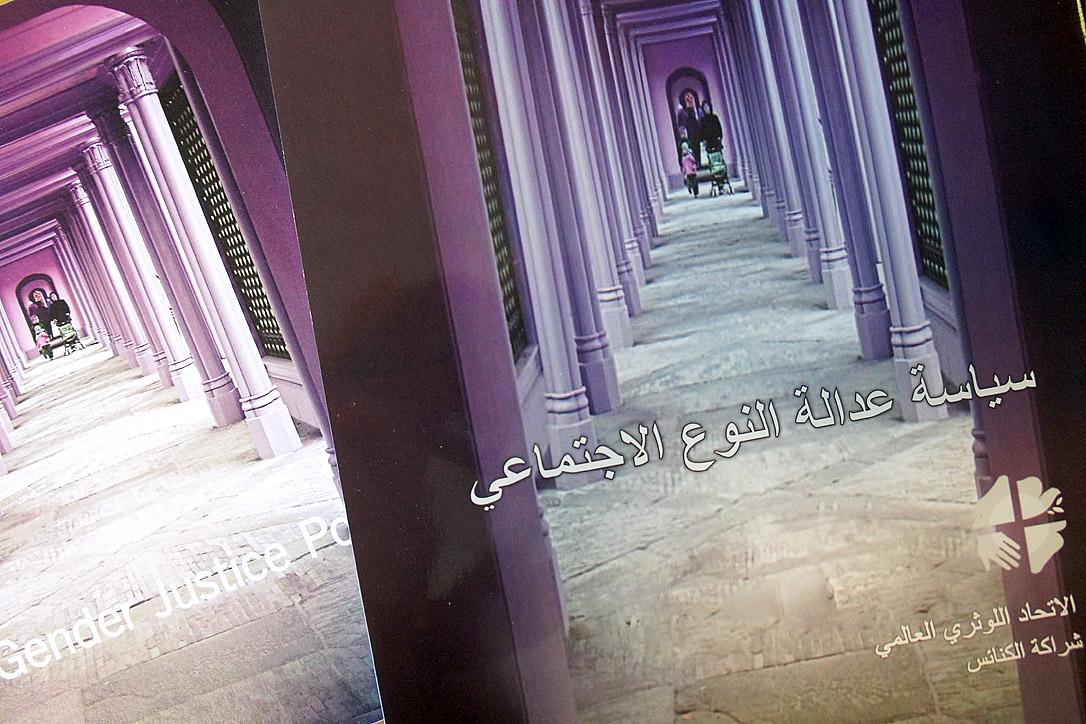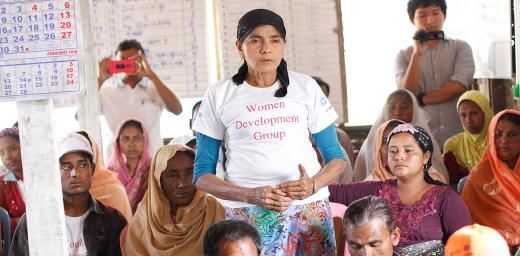Changing laws and patriarchal attitudes go hand in hand

The Arabic version of the LWF Gender Justice Policy was launched at the workshop in Beit Jala. Photo: LWF/S. Gallay
Arabic version of LWF Gender Justice Policy launched in West Bank and Gaza
(LWI) - Unequal pay, unemployment, early marriages, and violence against women remain key challenges for women in the West Bank and Gaza, in spite of increased effort to reduce gender disparity, Palestinian lawyer Scarlett Bishara says.
“It is necessary to change not only the laws but also the cultural patriarchal attitude towards women,” the judge of the Ecclesiastical Court of the Evangelical Lutheran Church in Jordan and the Holy Land (ELCJHL) told 45 participants at a seminar organized earlier this month by The Lutheran World Federation (LWF) in Beit Jala, in the Bethlehem area.
The ELCJHL hosted the workshop which incorporated the launch of the Arabic version of the LWF Gender Justice Policy. The document defines theological processes and practices that help to promote just relations between men and women, and enhance women’s contribution to both church and society.
Rev. Dr Elaine Neuenfeldt, Secretary for Women in Church and Society program thanked ELCJHL for “translating the policy into Arabic, and making it accessible in your everyday language and interpretation of theological perspectives.” The notion of justice, she noted, implies that “different people require different tools of access, and not simply equal tools. This is true of women in many cultures.”
Insights from the LWF policy contributed to the revision of ELCJHL’s Ecclesiastical Court constitution in February 2015 to include equal recognition of men and women on family-related issues including inheritance. “The ELCJHL is the first and only church in the Middle East to apply such a policy,” said Rev. Sani Ibrahim Azar from the Redeemer congregation in Jerusalem. He noted the synod approved women’s ordination 12 years ago, but “there are still many steps to be taken in paving the way for justice for women within the church.”
Advocacy on women’s rights
Suheir Farraj, a human rights and gender activist from the Muslim community, spoke about faith-based organizations’ advocacy on the rights of women as enshrined in global treaties including the Convention on the Elimination of All Forms of Discrimination Against Women (CEDAW). She encouraged the church to “have a clear voice” on issues such as domestic violence and under-age marriage so that open discussions within the community can occur.
It is necessary to change not only the laws but also the cultural patriarchal attitude towards women
“I am proud of the Lutheran communion for holding a prophetic role, leading the way toward dignity for all, despite pushback from more traditional and conservative voices in society and the government,” she stressed.
Rev. Munther Isaac, assistant professor at Bethlehem Bible College elaborated gender justice as an essential value of the Lutheran faith and doctrine. “Sin destroyed the relationship between man and woman, and we are still working to restore balance and respect. We are all equally sinners before God, who defines justice as requiring equality, transparency, and accountability.”
Further training and awareness raising
Recommendations from the seminar included calls for further training to raise awareness about; the rights of women and girls, implications for families in mixed marriages of couples from different faiths, and strategies to include men in discussions on gender justice. The church was also asked to encourage more women to study theology and prepare them for the ordained ministry. As the ELCJHL runs several educational institutions and programs, plans should be developed to include gender justice awareness in school curricula and other training programs.
Speaking on behalf of the ELCJHL women’s committee, the workshop co-organizer Ms Suad Younan said she was convinced the church was on the right path with respect to human rights, family and women’s rights. She urged the Holy Land church “to use its prophetic voice and effective tools to challenge ecclesiastical and socio-political fixtures.” It is important “to join the women’s coalition in Palestine to promote and strengthen UN resolution 1325 [on women, peace and security] and be more proactive in CEDAW in order to monitor and record injustices in Palestinian society,” she added.
“This seminar was a huge success in bringing together the Lutheran congregations of the ELCJHL in important dialogue, training, and open sharing regarding gender justice in the Holy Land,” said ELCJHL Bishop Dr Munib A. Younan, who is also LWF President.
The Holy Land church has around 3,000 members in its seven congregations in Jerusalem, Ramallah, the Bethlehem area, in Amman and the Baptismal site in Jordan.





